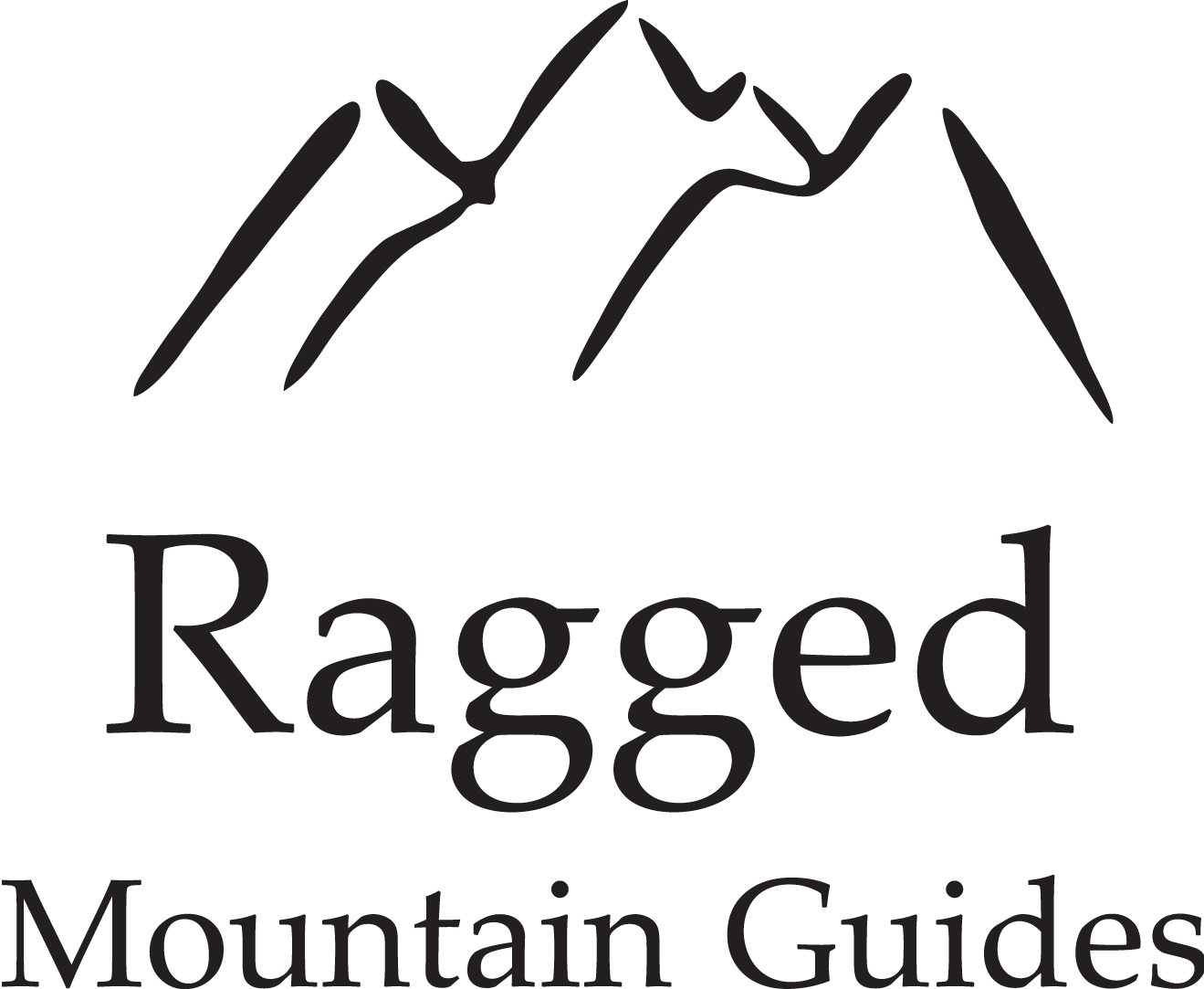Experienced Guides and Qualified Instructors
Based in the Northeast, Ragged Mountain Guides has a passion for climbing. You can count on us to help you reach your goals.


Rock Climbing
Our rock climbing programs are offered daily in the Ragged Mountain Area of Connecticut, the Gunks in New York, the Adirondacks, and the North Conway/Rumney areas of New Hampshire.

Learn the basics of knots and rope handling, belaying, rappelling, and functional climbing movement. We’ll look at how the equipment we use works and the tactics involved. We tend to do some top rope climbing, where the rope is hung above us from the top of a shorter cliff.
Polish up those basic skills, warm up on a top rope, and get ready to follow some routes led by your guide. We will discuss advanced belay methods, knots and hitches for multi-pitch climbing, and more advanced climbing movements like hand, fist, and foot jams. We will also tackle anchor design and physics.
For parties of three or more, we will refine our skills by top-roping progressively more challenging routes. There are many routes to choose from and too many to list, in fact! We will suggest routes that you might enjoy, in addition to ones you might propose.
Guided Climbs
Let us take you to your objectives. We would be happy to suggest some of the best routes in the east.
Rely on us to set you in motion to climb on your own. Simple to complex anchors and climbing site management will increase your proficiency at the crag. We’ll discuss all applicable knots and hitches, anchor considerations, materials, hardware, rappelling, edge negotiation, risk assessments, and bottom considerations. These are our most popular programs.
We are licensed to provide programs through the American Mountain Guides Association. We offer the AMGA Single Pitch Instructor Course and Assessment certification program. We can also provide the program at other locations at your request.
While many of these climbs are in close proximity to the road and car, some approaches can take more than an hour.
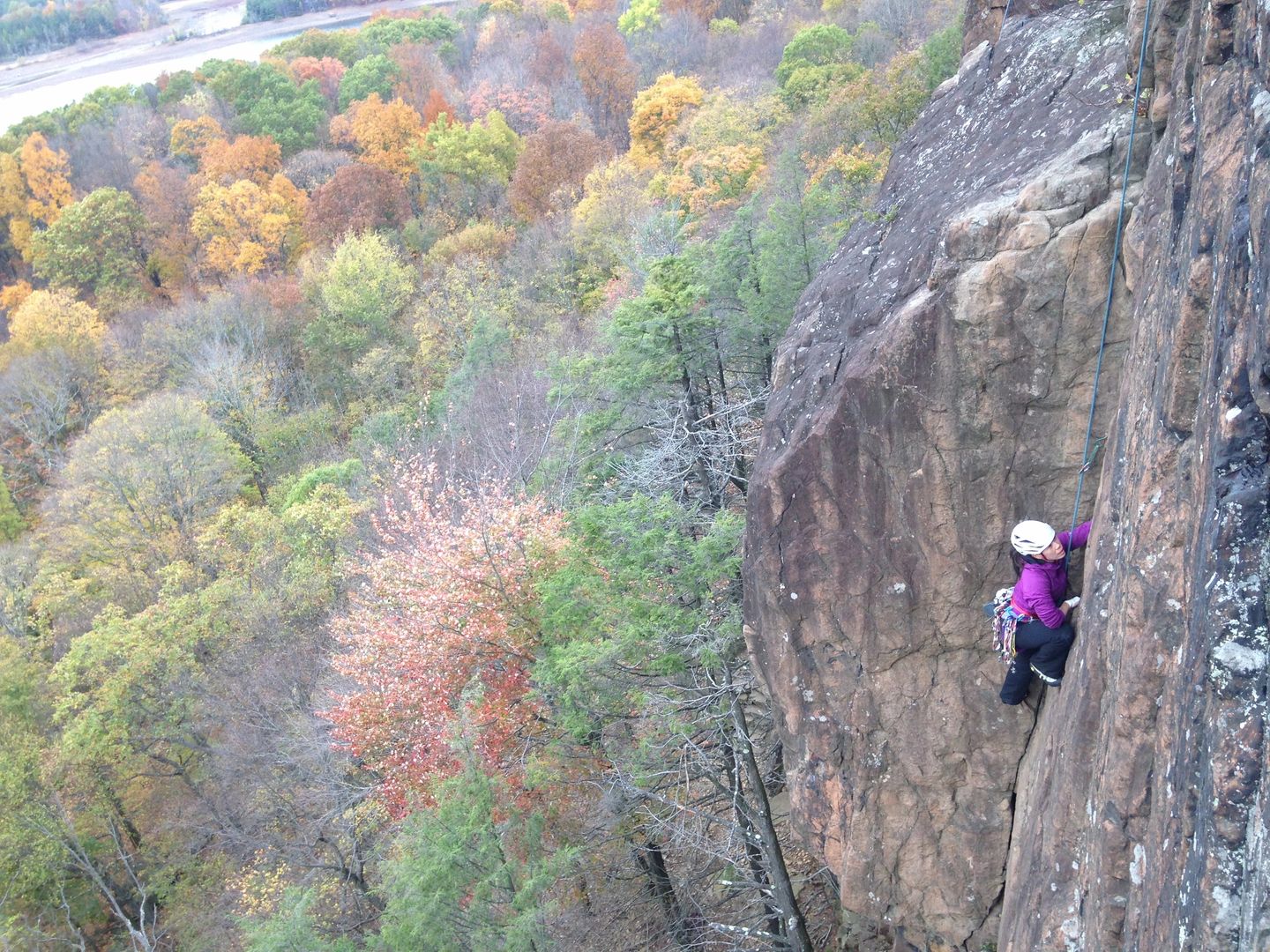


Ice/Alpine Climbing
These programs are offered daily throughout Northwestern Connecticut, the White Mountains in New Hampshire, and Catskills and Adirondack Mountains in New York. We will occasionally take trips to western areas, so please contact us for more information.
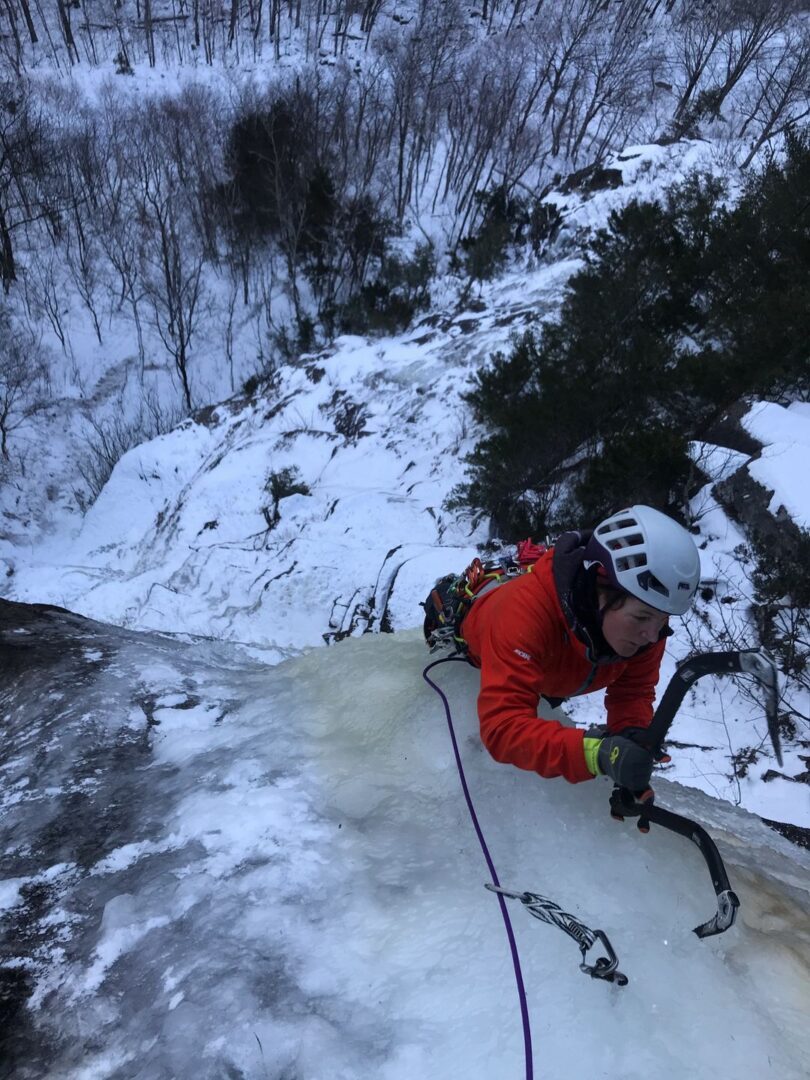
Learn to walk and climb in crampons and employ several techniques for everything, from slabs to steep vertical ice. The swing of the ice axe takes some practice for you to become efficient. We’ll use the best modern equipment and tools available. You will learn how to combat the cold weather and stay warm and dry. Ice climbing is addictive and an exciting way to spend a winter’s day.
Steep ice climbing techniques are practiced, and a multi-pitch climb or two will provide a capstone to your learning. You will also get a taste of how the ropes, ice screws, and other protection provide security on more complex terrain.
This program is offered throughout Northwestern Connecticut, Southern New England, Crawford Notch State Park, in the White Mountains in New Hampshire, and Catskills and Adirondack Mountains in New York. We will occasionally take trips to western areas, including Colorado. Please contact us for more details.
Early Season Pinnacle Gully, Mt. Washington
- Mt. Willard via Cinema Gully and Hitchcock Gully, Willey’s Slide, Silver Cascade, Flume Cascade, Shoestring Gully, etc.
- Cannon Mountain’s famed Black Dike or Fafnir
- Technical routes in Huntington Ravine on Mount Washington are among the best anywhere. Cold, windy, exposed, long climbs will test your mettle. These all include some ice climbing (some more than others) and travel over steep snow. Pinnacle Gully, O’Dell’s Gully, Damnation Gully, North Gully, Yale Gully, South Gully, and Central Gully are the classics.
- For non-technical summit climbs of Mount Washington via Lion’s Head and Ammonoosuc Ravine, ice axe and crampon use are required for travel. We’ll see how long climbs are broken down into sections and discuss land navigation tools and techniques. Experience the most challenging conditions of any mountain range in the world!
- Presidential Range Traverses are within two or three days.
- Mt. Colden’s Trap Dike is an all-time classic moderate. Six hundred feet of technical climbing lead to 1000 feet of exposed snow climbing. On a nice day, this is a hard climb to beat. It ends right on the summit of Mt. Colden above Avalanche Pass.
- Gothics North Face, the eastern Nordwand. Snow and ice plaster this face later in the season to provide a fantastic journey up to a great summit.
- Non-technical ascents of Mt. Marcy and Algonquin Peak are also available.
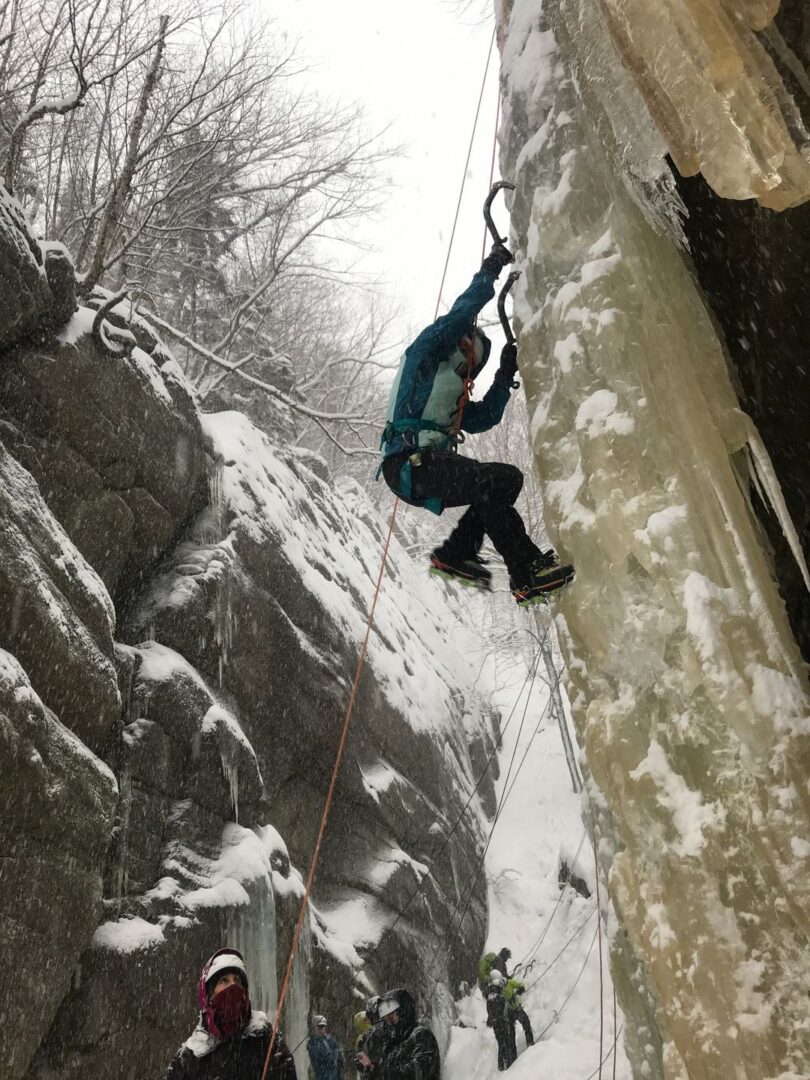
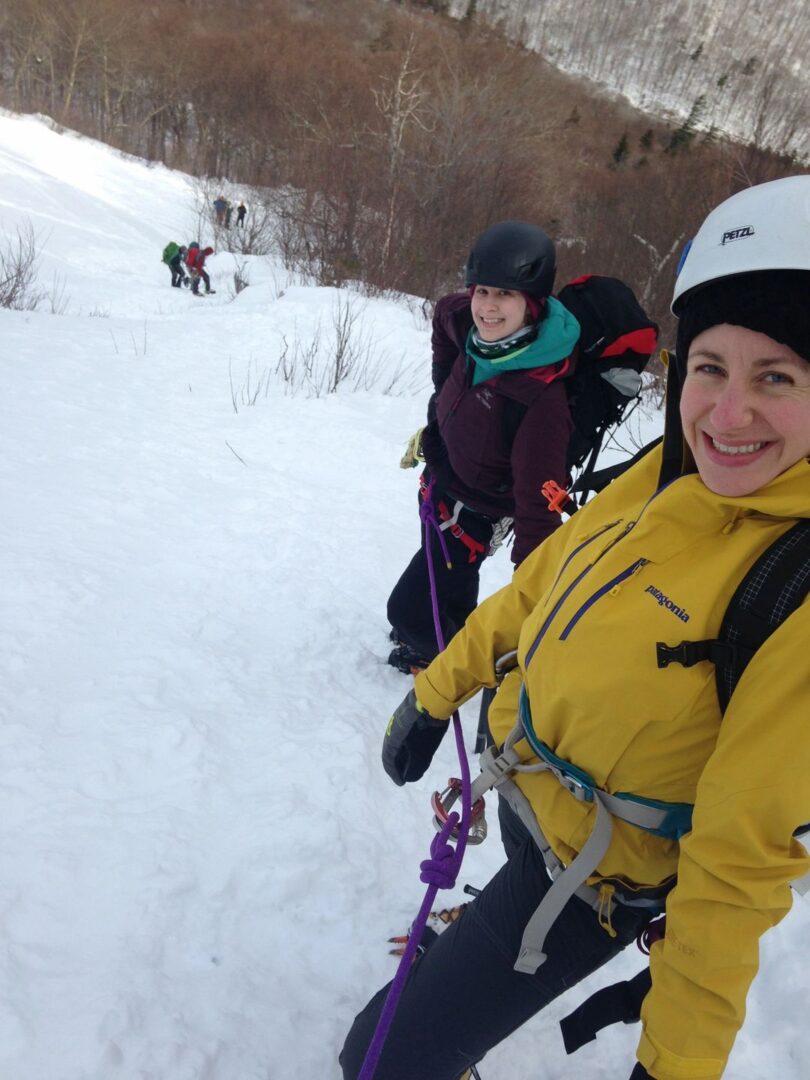
Three-Day Comprehensive Mountaineering Program
Our high-speed three-day comprehensive mountaineering program is a good way to train for ascents in the Cascades, Alaska, and European Alps. It is also a fine program for those climbers looking to further their general mountaineering skills.
Day 1 will find us gearing up and heading off for some skills training. We will learn how to use crampons, ice axe, ice tools, rope basics, and more.
On day 2, we will practice our skillset and climb a multi-pitch training climb, like Willey’s Slide and Hitchcock or Shoestring Gully. We call it a training climb so we can use and develop the skills from the previous day in more complex terrain.
We will attempt to climb Mt. Washington by a technical route on day 3. An overnight stay in a tent or a high mountain hut can be arranged for an additional small fee.

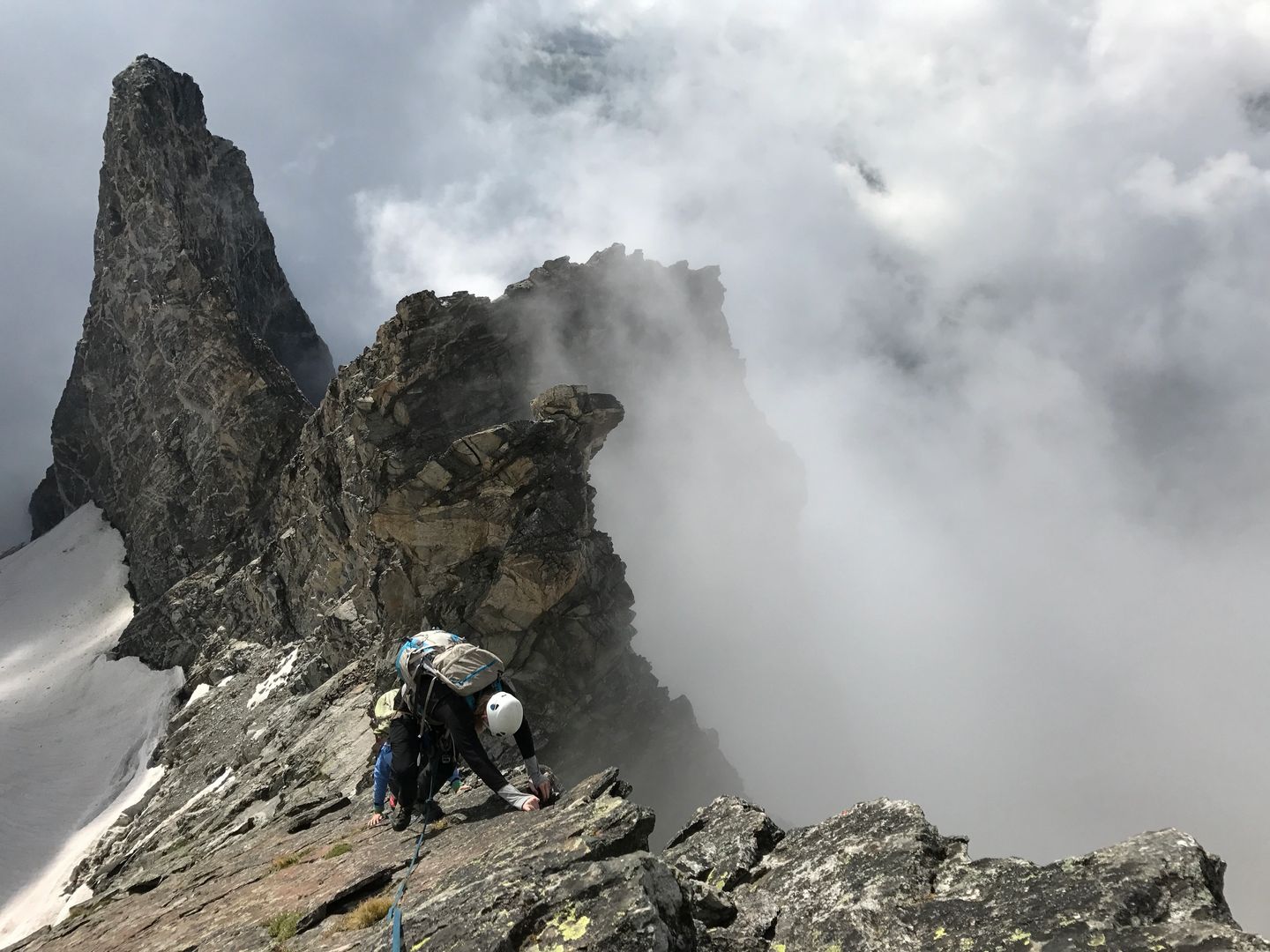
AMGA Programs
We are hand-selected and nationally licensed by the American Mountain Guides Association (AMGA) to provide climbing instructor and guide training programs. Currently, we offer the AMGA Single Pitch Instructor (SPI) course and assessment exam as well as the AMGA Climbing Wall Instructor (CWI) program. These courses are demanding and have prerequisites.
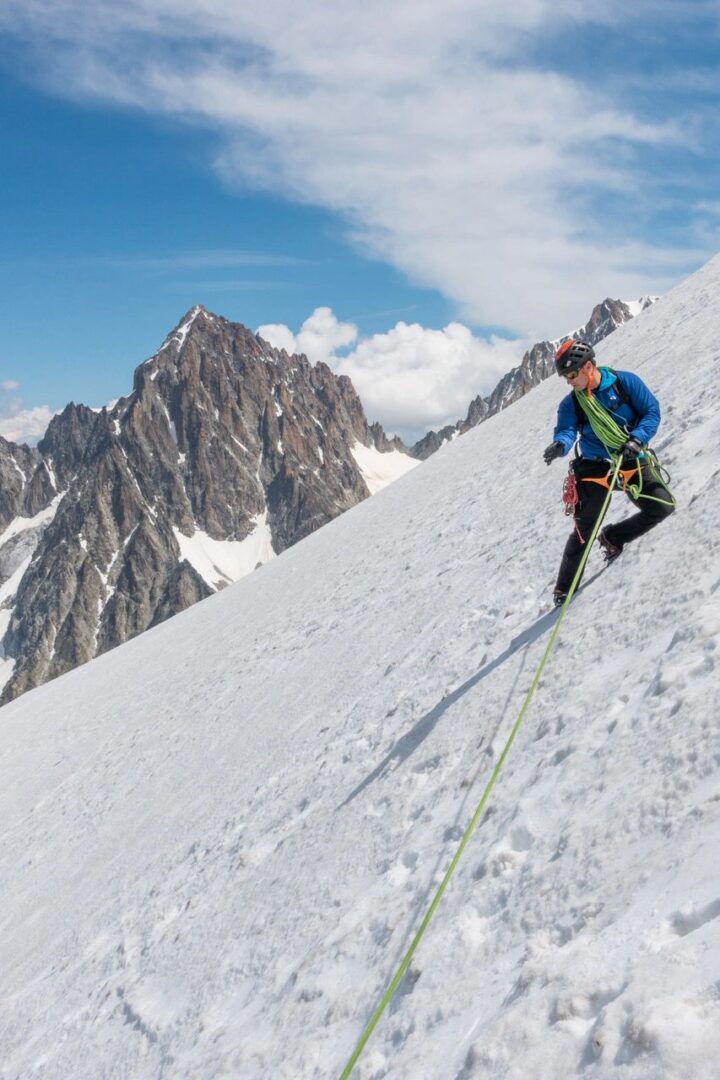
AMGA Single Pitch Instructor Program
The SPI Program is a three-day (27 hours) training course and separate two-day (16 hours) assessment. Certification lasts for three years as long as the candidate keeps current AMGA Membership and First Aid Certification. After three years, current SPIs can retake the assessment to regain certification. Taking any higher level AMGA courses also revalidates the SPI certification for another three years.
The SPI program is for current, active rock climbers that have a real desire to teach rock climbing to novices in a single pitch setting. Candidates should be passionate rock climbers that have their own equipment, regularly climb, and have been rock climbing outdoors for at least 12 months. Participants could be current university professors that teach climbing, climbing instructors, scout leaders, and summer camp professionals.
Applications are also accepted from climbers who wish to achieve additional training, experience, and certification to gain employment as a climbing instructor in the outdoor industry. The SPI will be able to proficiently facilitate and instruct the sport of rock climbing in a single pitch setting.
For the SPI Program, a single pitch climb is one that is climbed without intermediate belays and presents no difficulties on approach or retreat, such as route finding, scrambling, or navigating.
*70% of AMGA Rock Guide Course participants have completed the AMGA SPI Course.
AMGA SPI PROGRAM Dates are available at amga.com
Dates are added regularly, so please check back frequently.
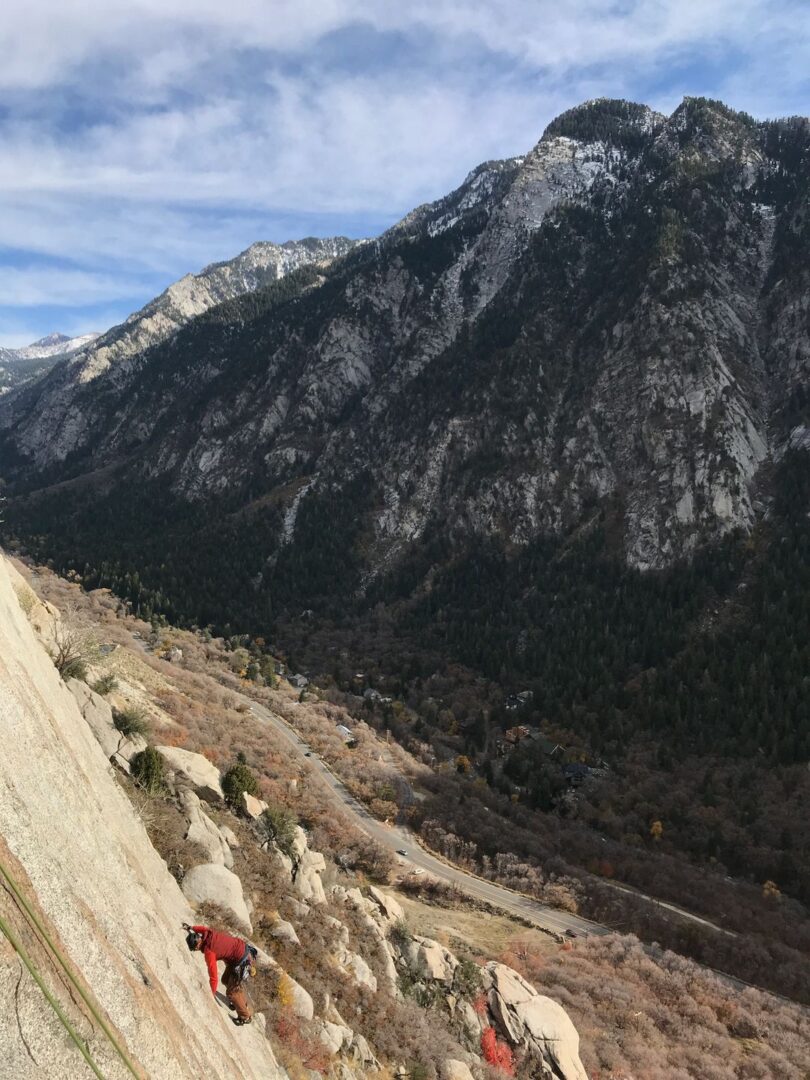
Review From a Satisfied Client
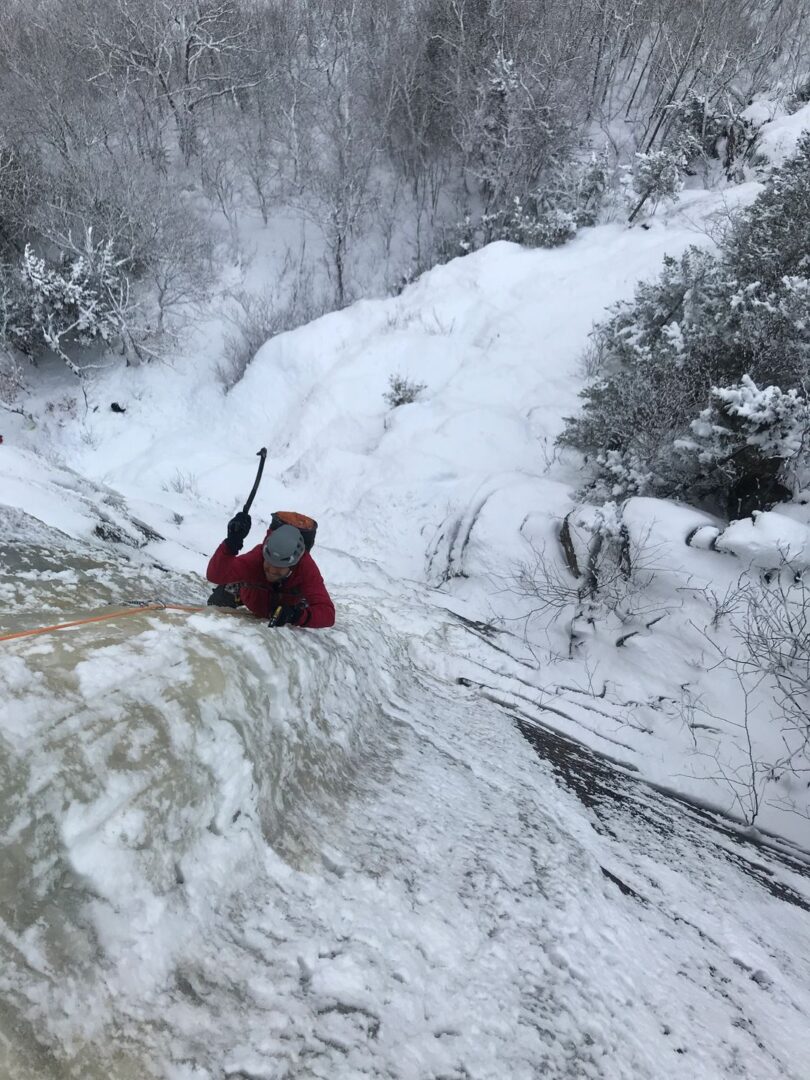
SPI Program Hours and Ratios
- This program is a minimum of 27 hours, normally run as three consecutive nine-hour days or day classes with evening sessions.
- The courses will not exceed a ratio of six students to one current SPI program provider.
- The maximum number of students on any SPI Program will be twelve.
- The evaluation is a minimum of 16 hours.
- The assessment should be run over two days. Candidates that meet the pre-requisites can take the assessment directly, following the course if they desire. Although, this is not recommended.
- SPI Assessment will not exceed a ratio of six students to one current SPI program provider.
- The maximum number of students on any SPI Program will be twelve.
The following three-day outline is the standard progression for the SPI Course. Your program may have a different daily schedule, and it is acceptable for program providers to do this as long as the entire curriculum is covered in your course. Program Providers may add to the curriculum but must not omit pieces. They must make it clear when they are teaching outside the curriculum and should not evaluate beyond it.
The course is normally run over three consecutive nine-hour days. But as long as all the curriculum is covered over 27 hours, the course could be reviewed on separate weekends or even as a semester class.
You meet the pre-requisites for the SPI course if you:
- Have a genuine interest in rock climbing and instructing novices on single pitch crags
- Are at least 18 years old at the time of the course
- Have at least 12 months prior climbing experience
- Are an active climber with traditional lead climbing experience (leader placing pro)
- Have lead climbed a minimum of 15 graded traditional rock climbing routes (any grade)
- Are capable of comfortably climbing 5.8 while on a top rope
The prerequisites are absolute minimums and most candidates have way more than the listed requirements. Without having at least this amount of experience, you are unlikely to play a constructive part in the course or be able to make the best use of the training. If you are unsure of your skill levels, we suggest hiring an AMGA/IFMGA certified guide to evaluate and enhance your skills and experience before SPI Program enrollment.
The SPI Assessment is two days in length (minimum of 16 hours of assessment time). It will take place at a single pitch climbing area where there are a selection of traditional lead routes in the 5.6 range and top-roping routes in the 5.8 range.
The assessment will examine all aspects of institutional single pitch climbing that the Single Pitch Instructor may encounter. Day one will look at climbing movement and all aspects of technical systems, from anchoring to assistance skills and general climbing competence.
On day two, the examiner may arrange for volunteer novice clients (non-paying) for the candidates to instruct in a group setting. This is not required but is a great benefit to the assessment process as the examiner can see candidates interact with real novice climbers and the examinees do not have to pretend to teach novice climbers who are actually other participants on the assessment.
The examiners job is to bring out the best in the candidate, and give him or her a comfortable and stress-free assessment. The candidate must show the examiner they have the technical and instructional skills to pass the AMGA Single Pitch Instructor assessment. The SPI Assessment is broken down into four distinct evaluation sessions:
- Climbing Movement
- Technical Skills
- Teaching Ability
- Group Management Skills
Candidates are evaluated by the AMGA marking system categories, namely:
- Risk Management
- Client Care
- Technical Systems
- Application
- Terrain Assessment
- Movement Skills
- Mountain Sense
- Professionalism
- Instructional Technique
In the AMGA SPI Program, the same nine categories are used for the rest of the AMGA assessments in the guide programs. This is for uniformity throughout the AMGA programs as they are all applicable to single pitch instruction and will help the candidate as they move onto higher-level assessments.
The SPI Assessment can be taken directly after the SPI Course if the candidate completed the program and meets the pre-requisites. However, it is highly recommended that the SPI Course candidate takes time practicing and consolidating the skills learned on the course before assessment (6-12 months).
You meet the SPI Assessment prerequisites if:
- You have completed an AMGA Single Pitch Instructor Course or AMGA Top Rope Site Manager Course.
- You have trad lead climbed a minimum of 40 rock climbing routes. A large number of these should be at 5.6 grade and hopefully on a variety of rock types.
- You are capable of comfortably lead climbing 5.6 traditional routes (leader placing protection). You will demonstrate your leading ability on a variety of paths on the assessment.
- You are capable of comfortably climbing 5.8 while on a top rope.
To gain SPI Certification, candidates must:
- Pass the SPI Assessment
- Hold Current AMGA Membership at Professional Level
- Possess Current First Aid Certification (See SPI Certification First Aid Requirements)
There is no longer an exemption from training. To participate in the AMGA SPI exam, you must first complete the AMGA SPI Course or have previously completed the Top Rope Site Manager Course, which ended in 2007. Please call ahead if you have not completed your SPI course with us.
AMGA Climbing Wall Instructor Program
The course is two and a half days in length and a minimum of 20 hours of instruction, skills demonstration, and evaluation. It addresses the basic technical skills necessary to manage an instructional program at a climbing facility. The course will also address the following general areas:
- Client Orientation and Instruction
- General Climbing Skills, Including Movement
- Top-Rope and Lead Belaying Techniques
- Equipment and Facility Use
- Rescue and Emergency Procedures
At a minimum, training for candidates shall occur in each of the following technical competency areas. Applicants shall possess sufficient knowledge and demonstrate skills and teaching ability in each competency area (if appropriate to the topic) to complete the course.
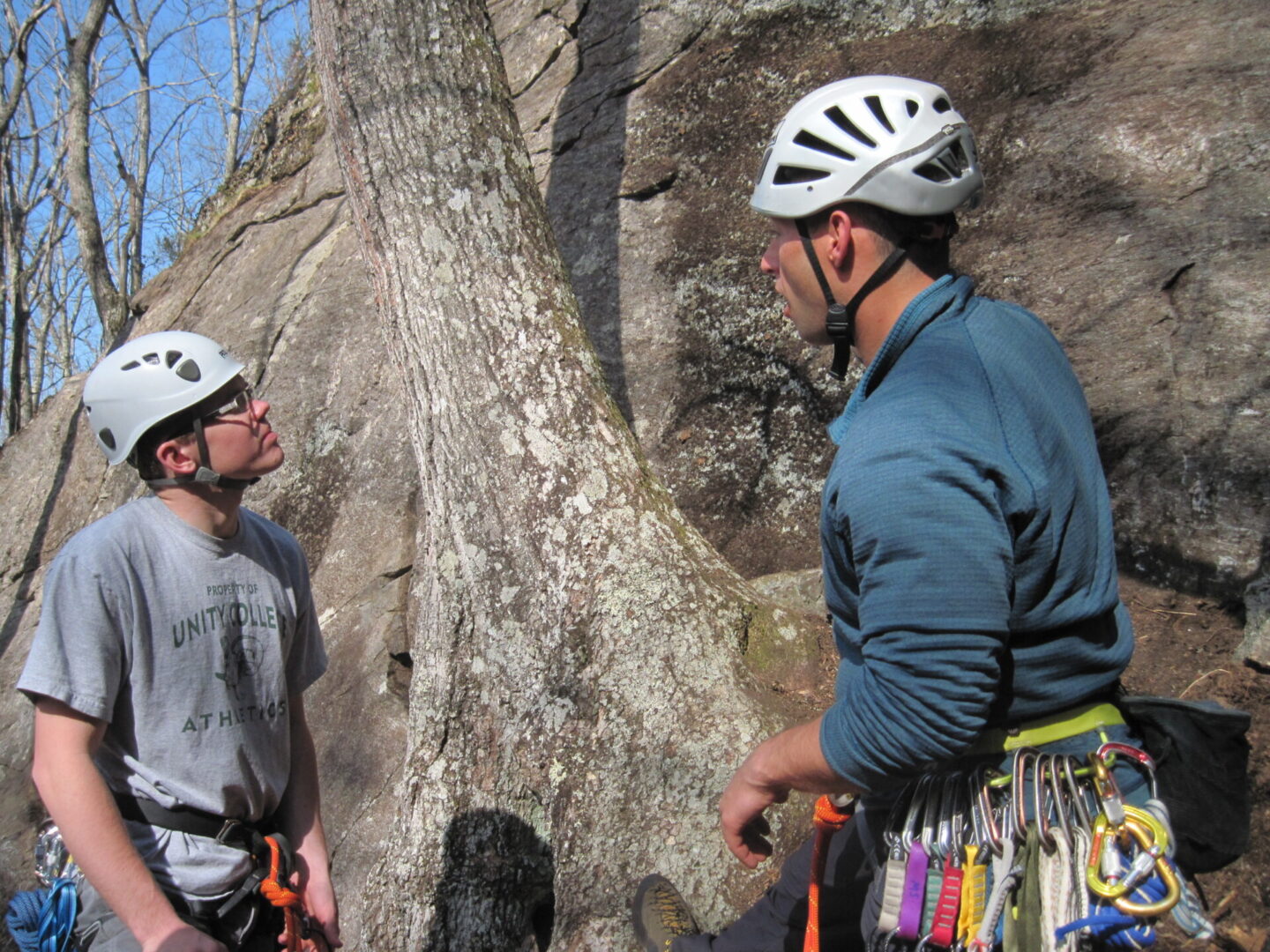
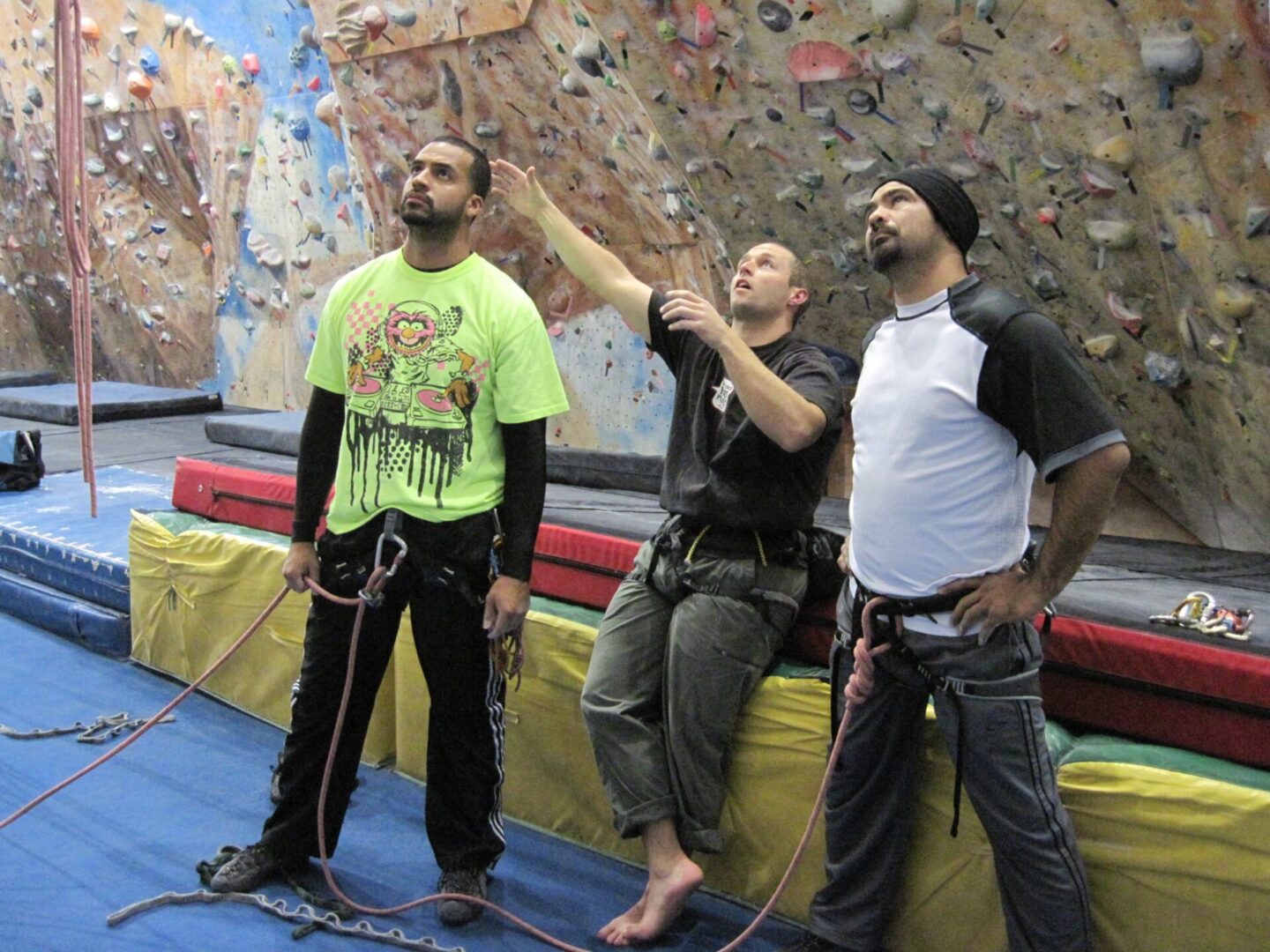
Certification Program Goals
- To increase the level of professionalism in indoor climbing in the USA
- To improve the level of climbing wall instruction in the USA
- To develop a more consistent standard of care for climbing instructors in the USA in the following areas:
- Client Orientation and Instruction
- General Climbing Skills Including Movement
- Proper Belaying, Leading, and Rappel Techniques
- Correct Equipment Care and Use
- Proper Facility Use, Care, and Inspection
- Rescue and Emergency Procedures
- To evaluate the skills of climbing instructors in the USA
- To provide guidance for further professional development
